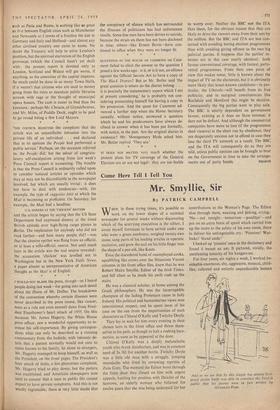I WOULD NOT BLAME the press, though—as I heard people
doing last week—for going into such detail about the illness of Mr. Dulles. The breakdown of the convention whereby certain illnesses were never described in the press (some, like cancer, were as a rule not even named) dates from Presi- dent Eisenhower's heart attack of 1955. On this occasion Mr. James Hagerty, the White House press officer, saw a wonderful opportunity to in- crease his self-importance. By giving correspon- dents what can only be described as a running commentary from the bedside, with intimate de- tails that a Patient normally would not care to make known to his family, let alone to strangers, Mr. Hagerty managed to keep himself, as well as the President, on the front pages. The President's later attack of ileitis, a less glamorous complaint, Mr. Hagerty tried to play down; but the pattern was established, and American newspapers now tend to assume that a man in public life cannot expect to have private symptoms. And this is not wholly regrettable; there is very little doubt that the conspiracy of silence which has surrounded the illnesses of politicians has had unfortunate results. Some fine men have been driven to suicide, because the strain on them has not been disclosed in time; others—like Ernest Bevin—have con- tinued in office when they were no longer fit. * ' *






































 Previous page
Previous page